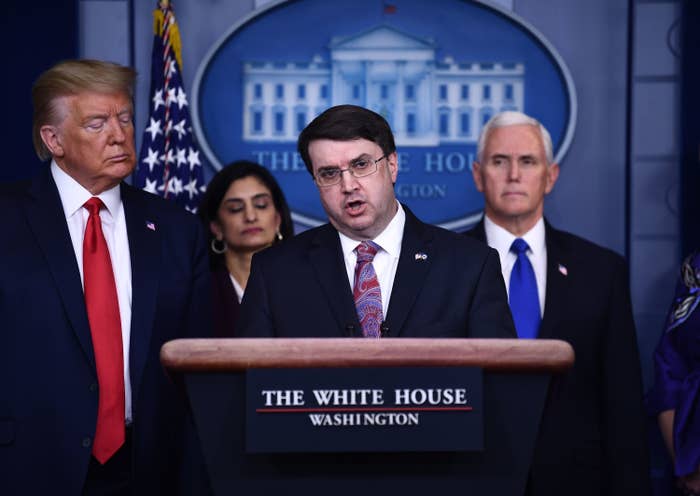
The journalists at BuzzFeed News are proud to bring you trustworthy and relevant reporting about the coronavirus. To help keep this news free, become a member and sign up for our newsletter, Outbreak Today.
As the novel coronavirus pandemic begins to overwhelm hospitals in the United States, millions of dollars in government contracts reveal how the Department of Veterans Affairs — which serves as a national backup in times of emergency — is preparing for the coming surge.
The VA has already awarded more than $50 million to build new isolation rooms, purchase masks and respirators, and upgrade some of its medical facilities. It also spent $40,000 for a stock of hydroxychloroquine, the antimalarial drug that President Donald Trump has touted as a possible COVID-19 treatment. And it awarded $3 million to multinational consultancy firm McKinsey & Co. “for consulting and modeling.”
The VA’s spending is the latest sign of how the US government is ramping up its response to the outbreak as more than a dozen agencies have allocated about $700 million in coronavirus-related spending since January.
Among the largest deals: 3M Company and Honeywell received $173 million and $148 million, respectively, from the Department of Health and Human Services to produce masks. Immediate Response Technologies received $96 million from the Department of Homeland Security to provide powered air-purifying respirators to New York hospital employees.
If you're someone who is seeing the impact of the coronavirus firsthand, we’d like to hear from you. Reach out to us via one of our tip line channels.
Even agencies less directly consumed with the pandemic response are affected. The Bureau of Alcohol, Tobacco, Firearms and Explosives sent $2.2 million to a South Florida–based company, C6 Tactical Corp., for “face masks, coveralls, and hand sanitizer” for its 6,000 employees, a spokesperson said. The US Agency for Global Media spent $126,000 on MacBook computers from Apple.
By law, the VA is supposed to be the country’s backup hospital system in times of national emergencies. When public or private facilities become overwhelmed, the VA is required to step in — as it is already doing in New York City, where it opened 50 beds to nonveterans.
The agency has spent millions of dollars on emergency beds for its facilities around Chicago and deployed mobile units in San Francisco, New Orleans, and Los Angeles. It spent more than $2 million procuring ventilators for sites including Albany, New York, and Ann Arbor, Michigan.
“The VA is going to be an absolutely critical part of the country’s response,” said David Shulkin, the department’s former secretary.
Shulkin, who worked at the VA under both Trump and President Barack Obama, said the agency has some advantages in a crisis like this: doctors with access to academic research centers, bigger stockpiles of emergency supplies, and a staff full of former service members who “want to continue to serve.”
But some of those staff members have raised concerns about the VA’s readiness. About a week ago, unions that represent VA employees said members had warned them of shortages of personal protective equipment and “serious problems” with leave policies for exposed workers. Union leaders sent a letter to Congress calling for frontline workers to be involved in the VA’s pandemic response planning.
During visits in March to about 50 VA facilities across the country, the Office of the Inspector General found similar issues — more than half of the sites had inadequate masks and gloves for workers and test kits and ventilators for patients.
“Employees are having to bring in their own masks, gloves, wipes, and hand sanitizer because the VA is not providing those things,” a union spokesperson, Brittany Holder, told BuzzFeed News on Thursday. “Anxiety levels are through the roof.”
Federal contracting records show that the VA has awarded more than 200 contracts or purchase orders related to COVID-19 since January, many of them focused on supplementing the department’s 170 hospital centers and 135 community living facilities. The VA was allocated $20 billion in the latest stimulus package to deal with the coronavirus outbreak.
Part of the VA’s plan includes “negative pressure isolation tents,” which prevent contaminated air from escaping isolation rooms, for the region that covers Utah, Wyoming, and Montana. It also spent $400,000 to bring 16 isolation rooms up to code in Baltimore, where four veterans have tested positive for the coronavirus. And it plans two “dual lane drive-thru tent structures” in West Palm Beach, Florida.
The VA has performed tests for its own patients and members of the public; as of Friday, it has recorded 2,184 positive tests and 78 patient deaths. The largest outbreaks are in New Orleans, with 346 positive tests, and Brooklyn, with 125.
Purchasing more equipment to keep workers safe has been among the agency’s biggest priorities. The VA purchased more than $3.4 million worth of powered air-purifying respirators and $265,000 worth of Purell for facilities in New York and New Jersey.


